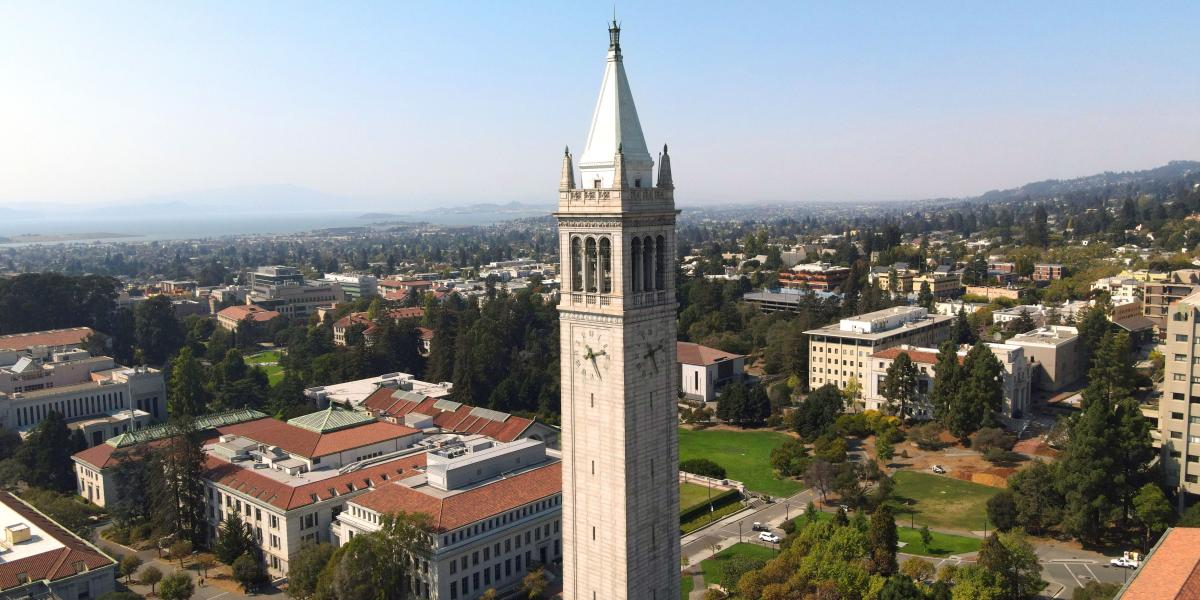Enlarge
The Sather Tower, also known as the “Campanile,” is one of UC Berkeley’s landmarks.
There was an opportunity from Berkeley Irene Högner a postcard view: “From the campus you can see straight ahead over the Bay of San Francisco and the Golden Gate Bridge on the horizon.” But her research stay at the Californian university gave the archaeologist much more than this beautiful view. At home at LMU she is working on a dissertation on “Social ties in the Mycenaean period” in the field of bioarchaeology.
Högner analyzes human skeletal remains and their burial sites in order to learn more about the social organization and family relationships of Bronze Age communities. When she was a guest in Berkeley for two months in the spring, she was evaluating the excavation documentation for her case study in Greece – and the personal exchange with a renowned researcher in this field greatly advanced her research.
“Professor Kim Shelton is a scientific luminary in the archeology of the Aegean Bronze Age,” said Högner. The site that Shelton is currently investigating is very similar to hers: “The burial site that I am analyzing is in central Greece, Professor Shelton’s excavation is in the Peloponnese,” says the doctoral student. “With her I was able to discuss current theses that are not yet discussed in detail in the research literature, as excavations and their publication are a very lengthy process.”
Högner’s trip was funded by the research cooperation “LMU-UCB Research in the Humanities”, with which the University of California, Berkeley (UCB) and the LMU have been strengthening their scientific collaboration since 2007. It is one of the first strategic partnerships that the LMU concluded as part of the excellence competition. The exchange between doctoral students, postdoctoral researchers and established scientists in the humanities is supported.
“Exchange of inestimable value”
Mehr zum LMU-UCB Research in the Humanities Program
Read more
Members of the humanities faculties are eligible to apply. As part of the cooperation, researchers can apply for travel funds or support for conferences and workshops. In the last ten years alone, around 150 joint scientific projects have come about. This year, for the first time, an interdisciplinary “LMU-UCB Research in the Humanities” conference on the future of the humanities will take place from October 17th to 19th.
“The cooperation between the LMU and the UCB enables our researchers to gain valuable experience in an international environment, exchange ideas and expertise and receive and give new scientific impulses,” explains the Vice President for “International Affairs and Diversity” at the LMU , Professor Francesca Biagini. “International exchange is invaluable, especially in the humanities. Because it brings together different cultural and scientific perspectives and thus contributes to a deeper understanding of complex social and historical contexts.”
A total of 48 LMU doctoral candidates like Irene Högner and 36 postdocs in the humanities have traveled to California with the program so far. Travel, administrative costs, such as the visa, tuition fees in Berkeley, as well as accommodation and living expenses are financed. “The accommodation, which I, like many other visiting researchers, found through private renters, was only a long walk from campus,” says Irene Högner.
Analyze antiquity together
As part of the partnership, 40 conferences and research workshops have also taken place in the last ten years alone. Just this year there were joint events on the topics “Divination, Doubt and Uncertainty in Early Modern Drama” in the field of English and Comparative Literature, “Dynamics of Tradition Building in Asian Buddhism(s)” in Classical Indology and “Uneven Development in the Ancient Mediterranean and Near East” in the field of ancient history. The latter was by the LMU historian Professor John Weisweiler organized together with his colleague from UCB, Professor Carlos F. Noreña.
The funding of their second conference on this topic as part of the cooperation – once in Munich, once in Berkeley – has “strongly advanced” their research, explains John Weisweiler, who researches inequality in the Roman Empire at his Chair of Ancient History. “A prominent example of such inequalities was southern Spain, which from the first century AD benefited significantly from the Roman Empire through flourishing olive oil production.” The region exported its products to Rome and to Roman military bases, thereby bringing great wealth to the local elites. while the Atlantic coast or the northern borders of the Roman Empire up to Hadrian’s Wall in England were hardly integrated.
“The unbureaucratic and predictable funding from LMU and UC Berkeley has enabled us to research this topic intensively together over the long term – something that would be much more difficult with external funding,” says Weisweiler. “This reliable collaboration creates a space in which ideas can develop freely, and promotes personal exchange, which often lays the foundation for new, creative research projects.” He now wants to tackle a project together with a historian from the UCB to research the role of women in the ancient economy.
Research on the California coast
In order to facilitate similar collaborations between established researchers from the two universities, the partnership with Berkeley also promotes visiting professorships: Over the past decade, more than 25 UCB professors have been guests in Munich at the invitation of LMU colleagues; LMU researchers have also gone to Berkeley for visiting professorships.
The scientists are asked to present their current research projects at the host university in the form of a public lecture and, depending on the length of their stay, are also encouraged to contribute to teaching with a lecture or course. For next year, Professor Jeroen Dewulf from the UCB will be a visiting professor at the Faculty of Catholic Theology in Munich, while Dr. Charlotte Lerg from the Americas Institute at LMU will take up a visiting professorship at the English Institute in Berkeley in the spring.
Doctoral student Irene Högner “benefited greatly” from the personal exchange not only with the Berkeley professor, but also with doctoral candidates with similar dissertation topics. In addition to their research work, they were fascinated by the nature of the California coast as well as the ancient ecosystems and sequoias in the national parks. The Bay Area’s diverse cultural offerings also offered “exciting opportunities for intensive cultural and intercultural experiences.”
And last but not least, a green space in the middle of Berkeley gave rise to contemporary historical reflections: “People’s Park is seen as a historical location for the 1968 student movement, when they demonstrated against social inequality and war,” explains Högner. “In recent years, as a result of various socio-political challenges, it has once again become a focal point of still-vibrant local activism in Berkeley.”More information:
More about LMU’s strategic partnerships


